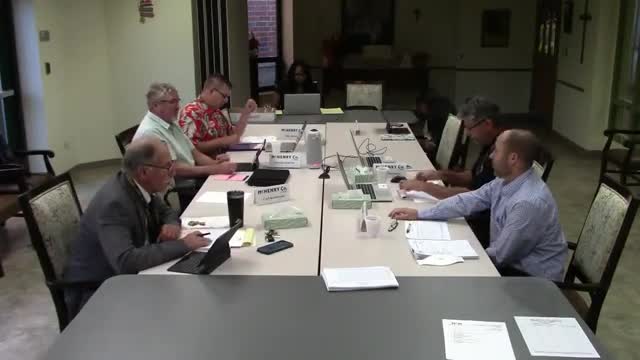Closure of Hearthstone removes over 100 beds from local inventory, Valley High reports increased referrals
October 03, 2025 | McHenry County, Illinois
This article was created by AI summarizing key points discussed. AI makes mistakes, so for full details and context, please refer to the video of the full meeting. Please report any errors so we can fix them. Report an error »

Valley High administrators told members Oct. 3 that the recent closure of Hearthstone removed more than 100 skilled- and assisted-care beds from the local market and is contributing to a surge of referrals to remaining facilities.
The administrator said Hearthstone included a skilled unit and an assisted-living portion and that both segments were effectively removed from the available inventory. "I'm not sure exactly how many beds they have, but it was over a 100. So that was a big facility," the administrator said.
The administrator said a new owner assumed the facility's license and operation on Oct. 1, but the building did not come onto the market in the ordinary way and the census and staff did not transfer. Administrators discussed possible reasons a buyer might not have stepped in: lack of full sprinkler systems in older buildings, electrical problems requiring costly remediation, or other capital issues that make rehabilitation costly. "Either, a, that building is not fully sprinkled ... or I've heard ... they have significant electrical issues," the administrator said.
The loss of Hearthstone beds was cited as one reason Valley High has received a high number of recent referrals; the administrator said the facility had received 75 referrals in the last several days. "That's why I have 75 referrals," the administrator said when asked about the effect on Valley High's bed demand.
Administrators and members discussed the broader system effects: long-term care facilities act as a discharge pathway for hospitals, and if beds are unavailable the entire acute-care system can be stressed. The administrator said some facilities may have beds available but lack staff to accept admissions, prolonging hospital stays and tying up beds.
Board members asked to revisit marketplace conditions in six months to assess whether buyers or new operators have emerged and to consider systemwide remedies to relieve hospital backlogs; administrators said they will include market updates as part of future administrator reports.
The administrator said Hearthstone included a skilled unit and an assisted-living portion and that both segments were effectively removed from the available inventory. "I'm not sure exactly how many beds they have, but it was over a 100. So that was a big facility," the administrator said.
The administrator said a new owner assumed the facility's license and operation on Oct. 1, but the building did not come onto the market in the ordinary way and the census and staff did not transfer. Administrators discussed possible reasons a buyer might not have stepped in: lack of full sprinkler systems in older buildings, electrical problems requiring costly remediation, or other capital issues that make rehabilitation costly. "Either, a, that building is not fully sprinkled ... or I've heard ... they have significant electrical issues," the administrator said.
The loss of Hearthstone beds was cited as one reason Valley High has received a high number of recent referrals; the administrator said the facility had received 75 referrals in the last several days. "That's why I have 75 referrals," the administrator said when asked about the effect on Valley High's bed demand.
Administrators and members discussed the broader system effects: long-term care facilities act as a discharge pathway for hospitals, and if beds are unavailable the entire acute-care system can be stressed. The administrator said some facilities may have beds available but lack staff to accept admissions, prolonging hospital stays and tying up beds.
Board members asked to revisit marketplace conditions in six months to assess whether buyers or new operators have emerged and to consider systemwide remedies to relieve hospital backlogs; administrators said they will include market updates as part of future administrator reports.
View full meeting
This article is based on a recent meeting—watch the full video and explore the complete transcript for deeper insights into the discussion.
View full meeting
